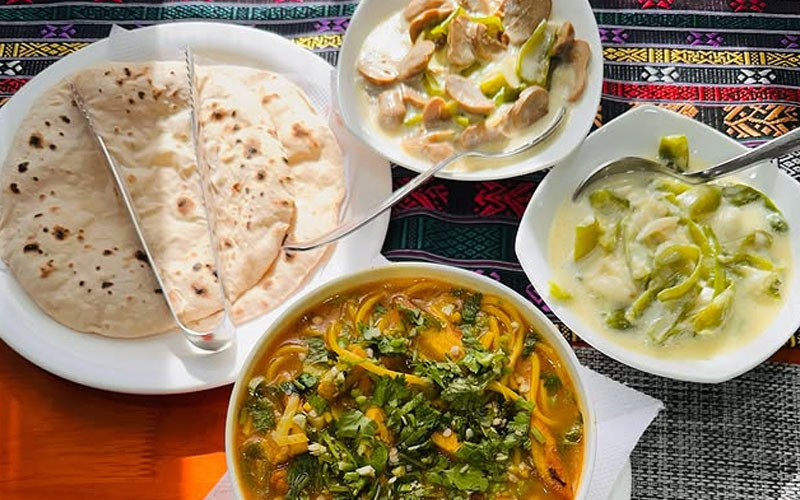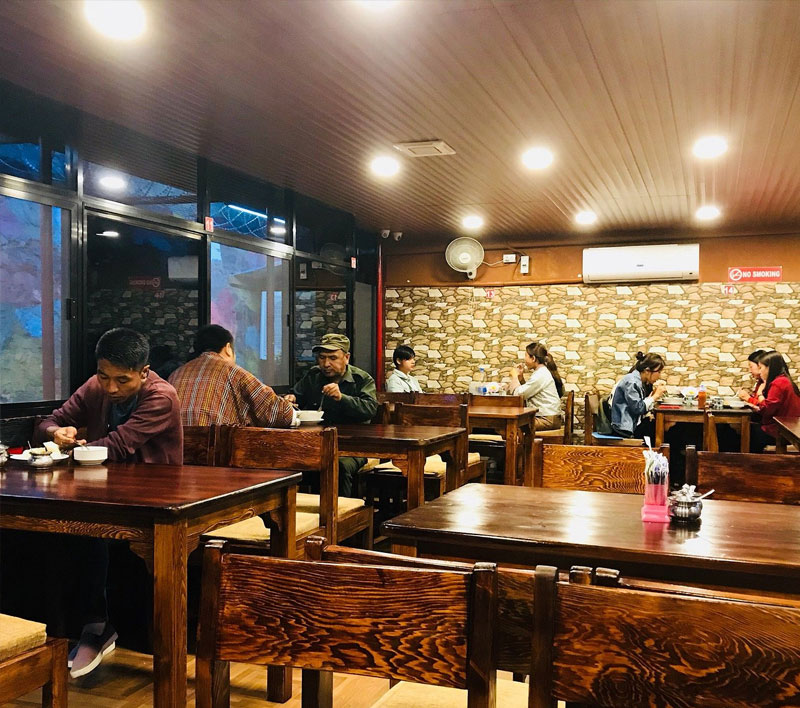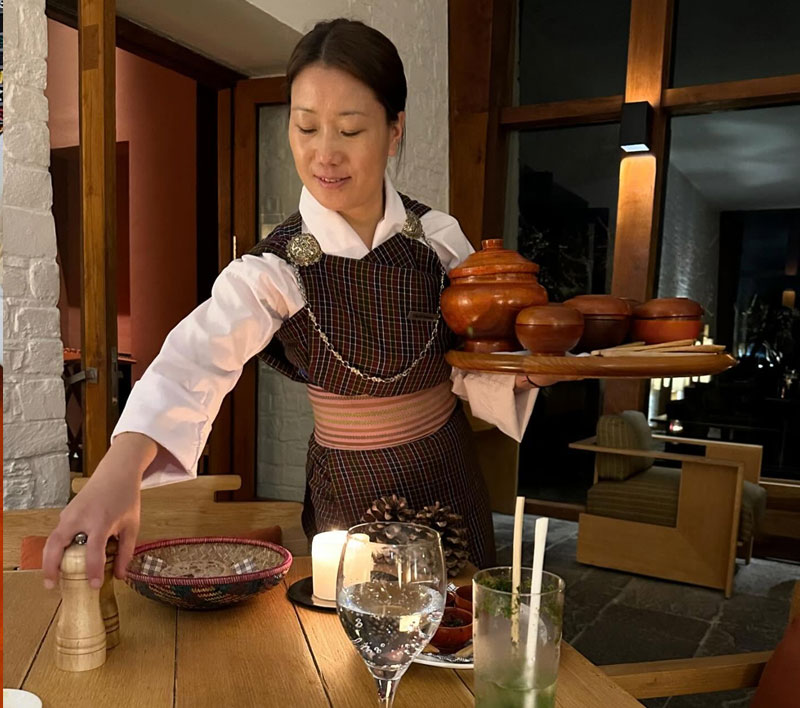Nestled in the heart of the Himalayas, Bhutan is a land of stunning landscapes, vibrant culture, and mouth-watering cuisine. Bhutanese food is more than just sustenance—it’s a way of life, celebrating the country’s deep connection to nature. Every dish, made from locally sourced ingredients, reflects unique cooking techniques, from the fiery heat of chilies to the savory richness of cheese. With its distinctive flavors, Bhutanese cuisine is as captivating as the country itself.
Beyond monasteries, snow-capped peaks, and scenic hiking trails, Bhutan offers unforgettable culinary experiences. Dishes like ema datshi—a spicy stew of chilies and cheese—are iconic. From mouthwatering buckwheat pancakes to hearty bowls of red rice, Bhutan’s cuisine is a must-try for travelers seeking authentic cultural immersion.
At Prime Himalayas, we bring you closer to Bhutan’s way of life. Let us guide you on a journey where every bite tells a story and every experience deepens your connection with this enchanting land.
What to expect from Bhutan’s cuisine?
In Bhutan, food isn’t just nourishment; it’s a celebration of love for the country and its culture. Known for bold flavors and simple preparation, Bhutanese cuisine deeply connects with the country’s religion. A standout is ema datshi, the national dish— a fiery stew made with chilies and cheese, showcasing the Bhutanese passion for spicy, creamy dishes blended into one flavorful experience.
Bhutan’s valleys and highlands provide the freshest ingredients, ensuring every dish bursts with flavor. Staples like red rice—nutty and nutrient-rich—and buckwheat-based foods, such as pancakes and noodles, are common at every meal. Bhutanese cuisine is also strongly influenced by Buddhism, with many dishes being vegetarian, reflecting the practice of non-violence. Rituals like offering a small portion to deities or spirits reflect mindfulness and respect for all living beings, embodying the Buddhist teachings of simplicity and reverence.

Top Bhutanese Dishes to Try
Bhutanese cuisine bursts with unique flavors and comforting dishes that showcase the country’s love for spice, simplicity, and locally sourced ingredients. Here are some must-try Bhutanese foods that offer a taste of its rich culinary heritage:
1. Ema Datshi
Ema datshi is Bhutan’s national dish, a spicy stew made with cheese and chilies. This dish is a staple in every Bhutanese household. Ema datshi is served with red rice, making it a perfect fiery palate and hearty cooking style.
2. Phaksa Paa
Phaksa Paa is a hearty, flavorful dish made by stir-frying slices of pork with dried chilies, radishes, and mountain spices. Served with Bhutan’s famous red rice, it balances the spice and perfectly complements the savory pork. The dish also includes ginger, garlic, or spinach, adding depth to the flavors. For meat lovers, Phaksa Paa is a must-try, offering a hearty and satisfying taste of Bhutanese cuisine.
3. Jasha Maru
This spicy chicken stew combines chicken with tomatoes, garlic, ginger, and chilies to create a flavorful, warming dish. It is typically served with rice and a favorite among locals and travelers alike.
4. Momos
Momos are traditional Bhutanese dumplings, typically stuffed with minced meat, cheese, or vegetables, and either steamed or fried to perfection. It is enjoyed as street food and is often served with a spicy chili dipping sauce.
5. Hoentay
These steamed or fried dumplings, filled with spinach, cheese, and buckwheat, originate from Bhutan’s Haa Valley. Their chewy texture and earthy flavor make them a popular comfort food.
6. Suja (Butter Tea)
Bhutanese butter tea, or suja, is a unique beverage made by blending yak butter, tea leaves, and salt. Traditionally served at social gatherings, it provides warmth and energy in Bhutan’s cold climate.
7. Ara
For those curious about Bhutanese local beverages, ara is a traditional alcoholic drink made from fermented rice, wheat, or barley. Bhutanese serve it warm and flavor it with butter or eggs.

Where to Taste Authentic Bhutanese Food?
If you are wondering where to taste authentic bhutanese food, there are plenty of restaurants in Bhutan from the bustling cities to hidden gems in the peaceful villages. Bhutan provides various places to indulge in its unique culinary delights.
Popular Restaurants in Bhutan
| Restaurants | Locations |
| San Maru Restaurant | Thimpu, Bhutan |
| Zombala 2 Restaurant | Thimpu, Bhutan |
| Folk Heritage Museum Restaurant | Thimpu, Bhutan |
| Mountain Cafe and Roastery | Paro, Bhutan |
| Sonam Trophel Restaurant | Paro, Bhutan |
| Dochula Resort Restaurant | Punakha, Bhutan |
| Merengma’s Bistro and Bar | Punakha, Bhutan |
| Takstang Cafeteria | Paro, Bhutan |
| Asian Kitchen Hotel Restaurant and Bar | Phuentsholing, Bhutan |
Furthermore, for a truly authentic local experience, travelers can wander into smaller, family-run eateries and local food stalls. These family-run cafes have small, intimate settings and offer home-cooked meals like ema datshi and paksha paa. These Bhutanese food spots serve hearty Bhutanese meals prepared from locally sourced ingredients like red rice, buckwheat, chilies, and vegetables. Additionally, visitors can enhance their food experience with street vendors that serve snacks like momos or zow shungo which are rich with authentic and simplest flavors.
Some of the tips for a memorable dining experience are listed below:
- Visitors can opt for small eateries and local cafes for warm, personal touch, and authentic recipes.
- You can try traditional dishes like phaksa paa and Jasha maru where you can understand the connection between food and Bhutanese culture.
- Taste local beverages like suja (Butter Tea) and ara (traditional alcohol).
- Also, visitors can interact with their guides to learn about fascinating stories about Bhutanese food rituals.

Bhutanese Food Etiquette
Dining in Bhutan is not just about indulging in plenty of flavors, it’s also about learning the Bhutan’s cultural traditions and values. Understanding these customs is important to enjoying your meal while respecting local traditions. Some of the important Bhutan food customs are listed below:
- Respect Local practices by accepting food with gratitude, especially at local villages or small eateries.
- While you are in local places or villages, eating with your hands is common for some dishes. So you must clean your hands before eating these dishes.
- Eat a small portion first and finish your plate to avoid wasting food.
- In some Bhutanese households, leaving a small portion of food shows that you are satisfied. You can also observe this practice with your guide.
- Meals are typically served family-style with common dishes, so always use designated utensils for serving. Avoid using your spoon or hands to take food from shared dishes.
- Lastly, if you’re full, politely refuse additional servings.
Looking for vegetarian and vegan options on your tour?
Bhutanese cuisine has various meal options for vegetarian and vegan people that reflect the country’s connection to Buddhist values and connection to its nature.
- Ema Datshi: Ema means “chili” and Datshi means “cheese” in Bhutan. Enjoy this national dish of Bhutan with a bowl of rice.
- Kewa Datshi: Kewa means “potato” and Datshi means “cheese.” You can also request a vegan version without cheese or with plant-based cheese.
- Shamu Datshi: Shamu Datshi features mushrooms cooked in a rich cheese sauce.
- Hoentay: Hoentay are dumplings filled with spinach or turnip leaves, wrapped in buckwheat, and often served with chili sauce.
- Buckwheat Pancakes: Also known as Puta, you can enjoy these pancakes with vegetable toppings, including vegetables and cheese.
- Suja: Suja is Bhutanese butter tea, an aromatic blend of butter and salt. Enjoy it with veggie cheese momos.
- Rice and Noodles: Plain rice and noodles are vegan-friendly options that you can enjoy with vegetable toppings.
- Momos: Momos come in both vegetarian and non-vegetarian varieties, with the vegetarian option typically filled with vegetables.
- Indian Dishes: Many restaurants and eateries in Bhutan offer Indian vegetarian dishes like dal, chapati, paneer, and various vegetable dishes.
Since vegetarian Bhutanese food options are widely available in restaurants and family-run establishments in Bhutan, vegan visitors should clarify their dietary preferences to their guides before starting the trip. Additionally, many restaurants and establishments are happy to prepare dishes tailored to your preferences, ensuring a satisfying dining experience.
Closing Tips for Food Lovers
Some of the useful food tips in Bhutan to make your culinary experience memorable are:
- Be adventurous and try Bhutan’s national dish, ema datshi. It’s a chilly-based dish, so if you don’t like spicy food, taste a small portion first.
- Explore family-run businesses or local spots to taste the most authentic flavors of fresh dishes made using locally sourced ingredients.
- While in Bhutan, don’t miss foods like red rice, puta, and suja.
- Travelers can ask guides or locals for the best food hidden gems or eateries.
- When eating out in Bhutan, choose local eateries for fresh handmade dishes and street foods made with regional flavors.
- For a complete experience, you can pair your meals with local drinks of Bhutan such as Ara and suja.
Conclusion
The bold use of chilies and fresh local ingredients, combined with a deep food tradition, makes Bhutanese cuisine truly unique. From the spicy Ema Datshi to the comfort of red rice and buckwheat pancakes, Bhutanese food reflects the country’s rich culture and hospitality. Likewise, each dish tells a story of tradition, simplicity, and a deep connection with nature.
Moreover, one of the best ways to immerse yourself in Bhutanese culture is by trying the local food—whether dining at family-run eateries, sampling snacks at local markets, or enjoying traditional meals during festivals. With each bite, you experience the heart of Bhutan. Have you tried Bhutanese food? Share your favorite dishes or any personal food experiences in Bhutan—we’d love to hear from you!
Lastly, don’t forget to try these incredible foods during your Nepal and Bhutan tour. After all, your journey isn’t complete without savoring the unique flavors that make Bhutan’s cuisine unforgettable!
